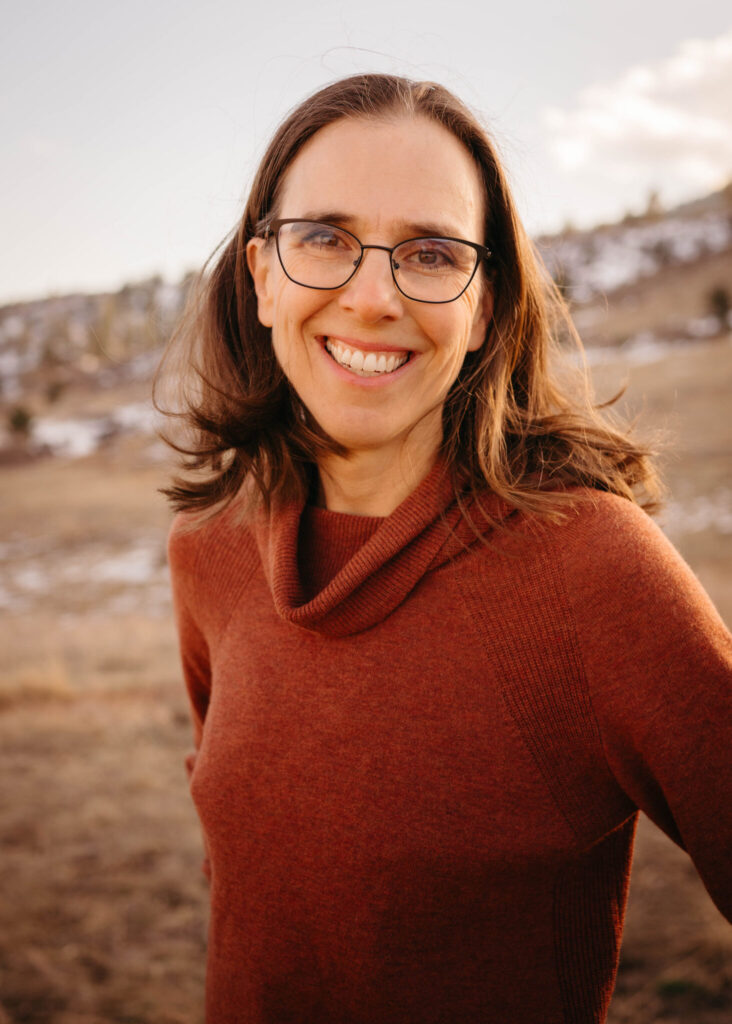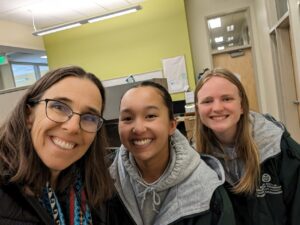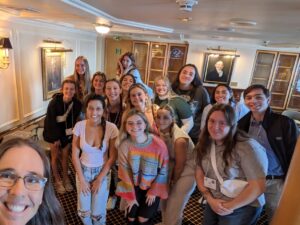Jen Johnson, who also goes by “JJ”, started a new position as director of the Engineering Success Center on February 1. Engineering SOURCE talked with her about her 18-year career in the SLICE office at CSU, what exactly the ESC does, and her thoughts on this moment in higher education.
What brought you to CSU?

I did my undergrad degree at the University of Minnesota in Minneapolis in genetics and cell biology. Immediately after, I spent time as a Peace Corps volunteer in The Gambia, West Africa, where I worked as a science teacher.
I came to grad school at CSU in 2002 in the Student Affairs in Higher Education program. My first professional job was a position that was split between the city of Fort Collins and CSU, working on “town-gown relations.” After a couple of years in that position, I landed in what is now called the Student Leadership, Involvement, and Community Engagement (SLICE) Office, where I spent 18 years and was most recently the director before coming to the Engineering Success Center.
My husband, Chris, did his master’s in social work at CSU, and he’s the director of Specialty Counseling Services at CSU now. We came for school and then just never left.
What do you do for fun?
I love being outside and moving my body. I start my day very early and outside. Our 17-year-old dog died in January, but we used to go for a two-mile walk together every morning. After that I go for a run or lift weights for another hour.
I love meandering around 14,000-foot mountains. I love forcing my children into stupid adventures like bike camping on the Mickelson Trail in South Dakota. We love visiting national parks and exploring all the natural beauty around us.

I have three kids who keep me super busy. I have a Ph.D. in education, but sometimes I joke that I also have a Ph.D. in driving a minivan. When I leave the office, I take people to track, soccer, football practice, swimming lessons, theater, basketball and volleyball! I’m not sure that’s particularly what I like to do in my free time, but that is what I’m doing.
I love sports. I have loosely organized a very terrible summer kickball team of CSU employees. Players that try too hard and get voted game MVP have to wear an adult-size pink fleece bunny suit in the next game as punishment.
I’m into nerd board games. Wingspan and Pandemic Legacy are my current favorites.
I had the opportunity to sail as a faculty member for Semester at Sea in Spring ’20 and Spring ’23. Chris and I both worked on the voyage, and we brought all three kids. I was so fortunate to be in the classroom working directly with students, visiting international locations that were beautiful and exciting.
Tell us about your role here in the College.

The Engineering Success Center serves all of the Engineering departments and all students in the Walter Scott Jr. College of Engineering. I’m the director of the ESC, which is a new role. We have 14 professional staff, plus student staff. Some of our specific areas of focus are recruitment, retention, inclusion, career services, and student success generally.
My job is to support all of those initiatives. I have the privilege of working through people, and helping those people to execute their work. Together, we think about how to maximize our impact, given limited staff, time, and resources. Where do we put our time, energy, and effort? That’s my job.
How do you evaluate whether the Engineering Success Center is, well, succeeding?
There are some really specific, tangible metrics that indicate success. In terms of recruitment, how many students are admitted, and how many enroll? Once they’re here, how many are retained, in the college and at CSU?
Looking at demographics, how many students of color, how many first-generation students, how many low-income students? Ideally, we want the gap between retention of students with privileged identities and of students that have historically marginalized identities to be zero, and we want 100% of them to be retained. That’s pie in the sky, but any progress on narrowing that gap and graduating more students overall would be a measure of success.
What do you think has changed about higher education in the last couple of generations?
One issue that is making me lose sleep has to do with demographics. In 1992 or so, we saw the largest number of births ever. When those students came to college in the early 2000s, it was kind of a boom time in higher education. There was abundance, there was energy. As we move into this next generation, there’s a demographic constriction happening. Responding to that reality in a way that “meets the moment” and helps us excel and focus on the things that matter. . . requires discipline.
The pandemic fundamentally shifted things for students and for human beings in general. Hybrid work and online learning created an abundance of options. But it also has created major concerns around sense of belonging. We’re seeing skyrocketing mental health challenges for young folks who are entering college. Our college students are lonely, and they’re a little bit reluctant to fully commit.
What I want for our students at CSU and in the Walter Scott Jr. College of Engineering– for all of us — is to feel valued, to feel like they have a place to belong. It’s critically important to their success. If students have close friends, and a close connection to a faculty member in the college, they know their advisor, and they are a member of a student group, when they get into that calculus or physics course that’s really kicking their butt, they’re way more likely to persevere and access resources available that can help them. They feel like they can ask for help and get what they need. But it takes commitment to build those connections.
All of this differentially impacts people based on identity and background. The pandemic was hard for everybody, but it was differentially hard for specific students: first-generation students, students of color, students from low-income families.
I’ve worked in higher education for a long time. I’ve witnessed a lot of changes. This moment presents a lot of challenges and lot of opportunity.
If we admit a student to CSU and the College of Engineering, I believe we have a moral responsibility to have resources available to help them succeed. It’s a matter of integrity.
I was at a conference in the fall, and [CSU president] Amy Parsons explicitly named student success as our top priority. It’s our number one goal.
There are so many factors that influence student success. It’s how faculty interact with students. It’s all the different support resources. It’s whether students feel belonging on campus. It’s how much students pay for their degree and living costs. It’s how people respond if students experience hardship. It’s how the campus culture affirms, centers, and celebrates people from diverse backgrounds.
The Engineering Success Center plays a role, but I believe that student success is everyone’s work at CSU.
If you had the opportunity to get a message to every incoming first-year student, what would you tell them?

When I was on my first Semester at Sea voyage, I sailed with a woman named Meg Jay who is a faculty member, therapist, and author who writes about people in their 20s. She calls your 20s your “defining decade.” The college years are full of ambiguity and can be really uncomfortable. But these years also so full of opportunity. One common message I hear from students is that they feel like imposters – everybody else has their act together and knows what’s going on. Here’s a secret: very few people have any clue! I try to encourage students not to get paralyzed by fear of failure. The college environment is the perfect place to figure things out and to try new things.
The only way you truly fail is if you don’t do anything. The way you succeed is to give it your all and experiment with different opportunities. Whether that means building a robot from scratch, learning how to pilot a drone, fostering relationships with people from different backgrounds, digging deep into your major of study, exploring hobbies like music or arts, joining a student group, becoming a Ram superfan, or putting skis on for the first time, making the choice to be curious and to explore different things is the best advice I can give.
The goal is to learn about yourself. You’ll always succeed if you try.